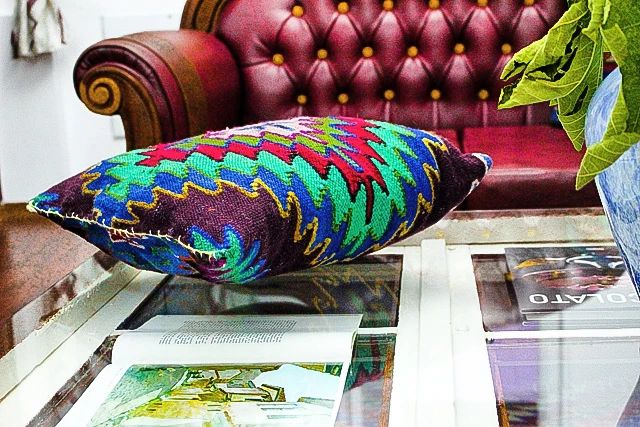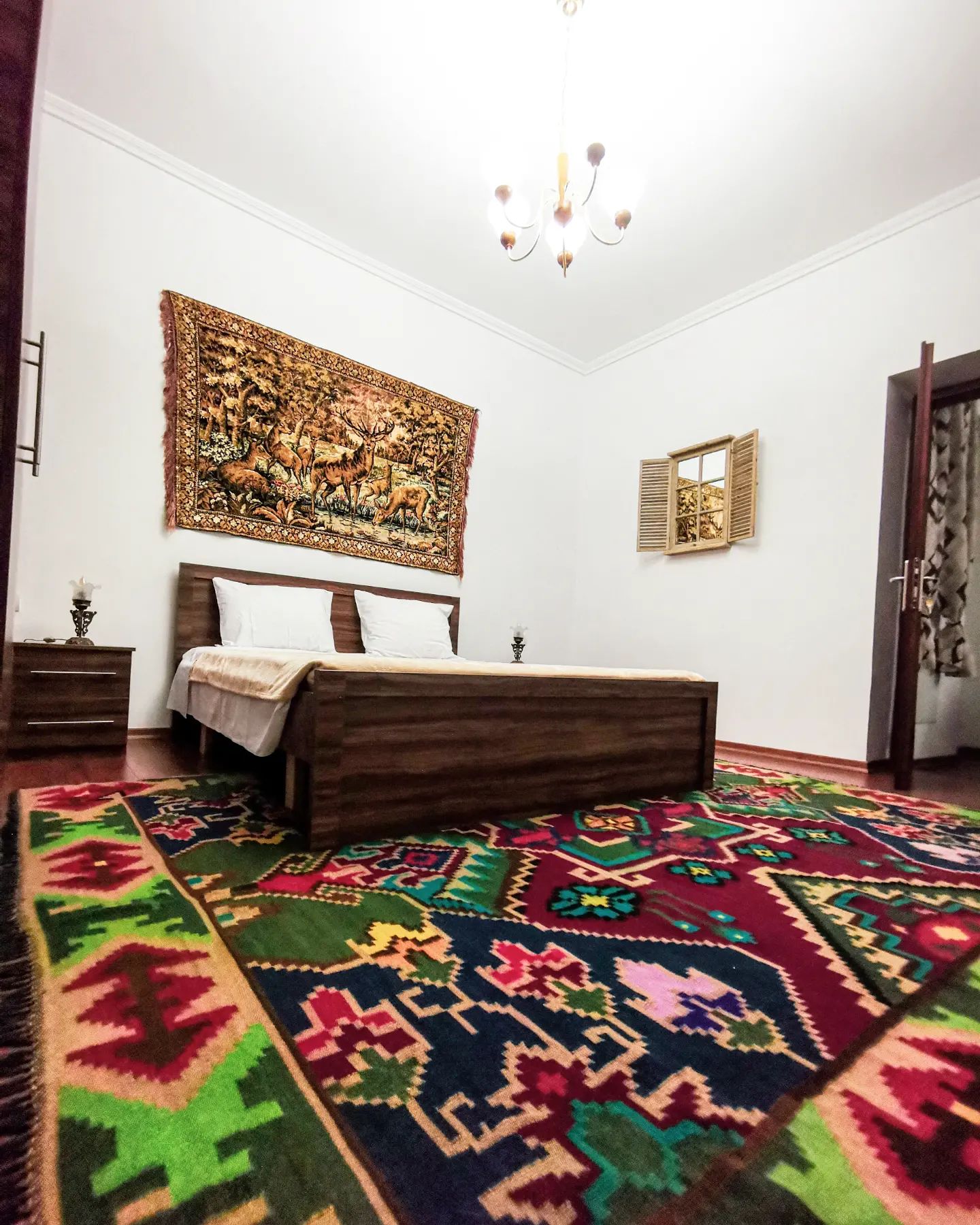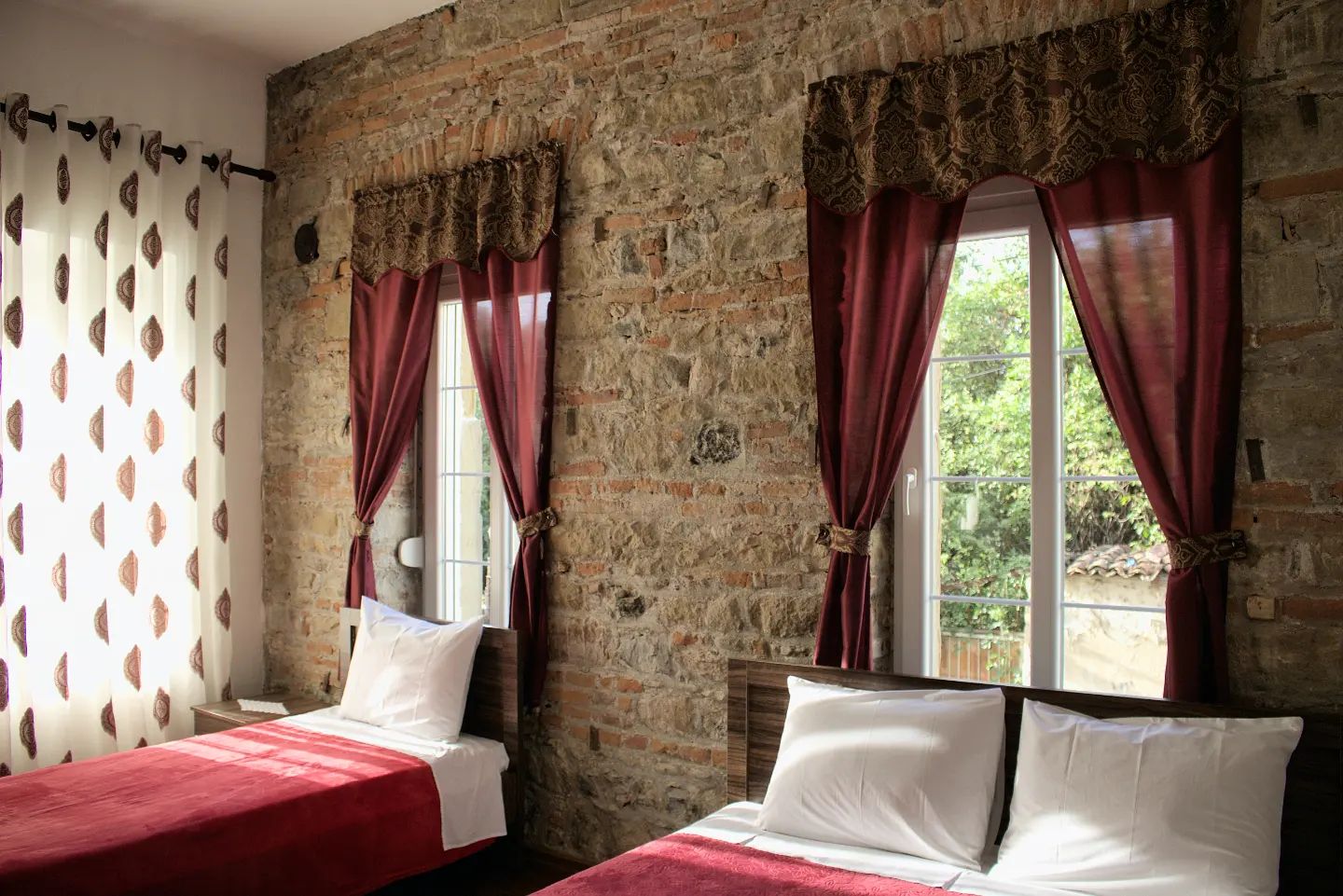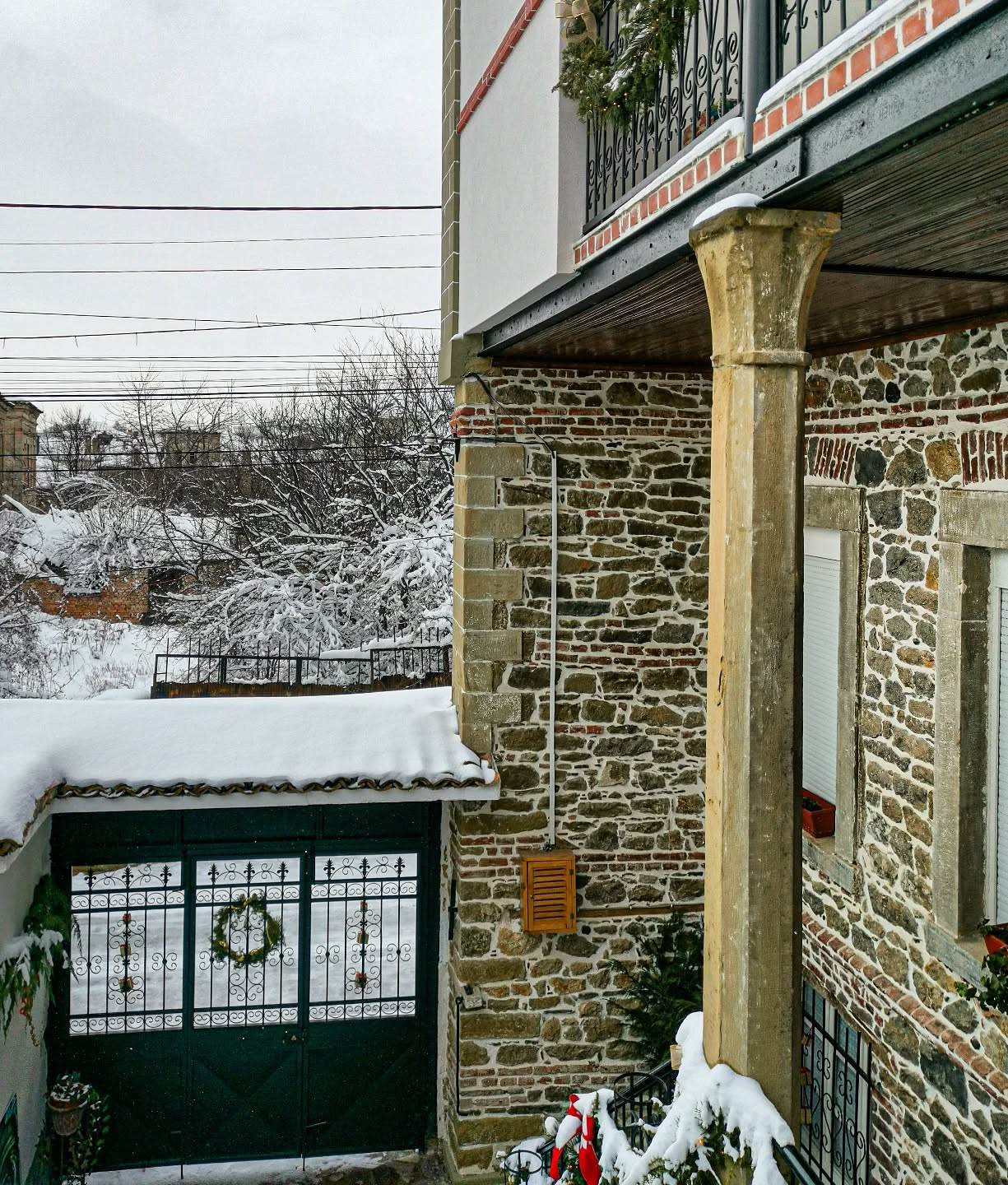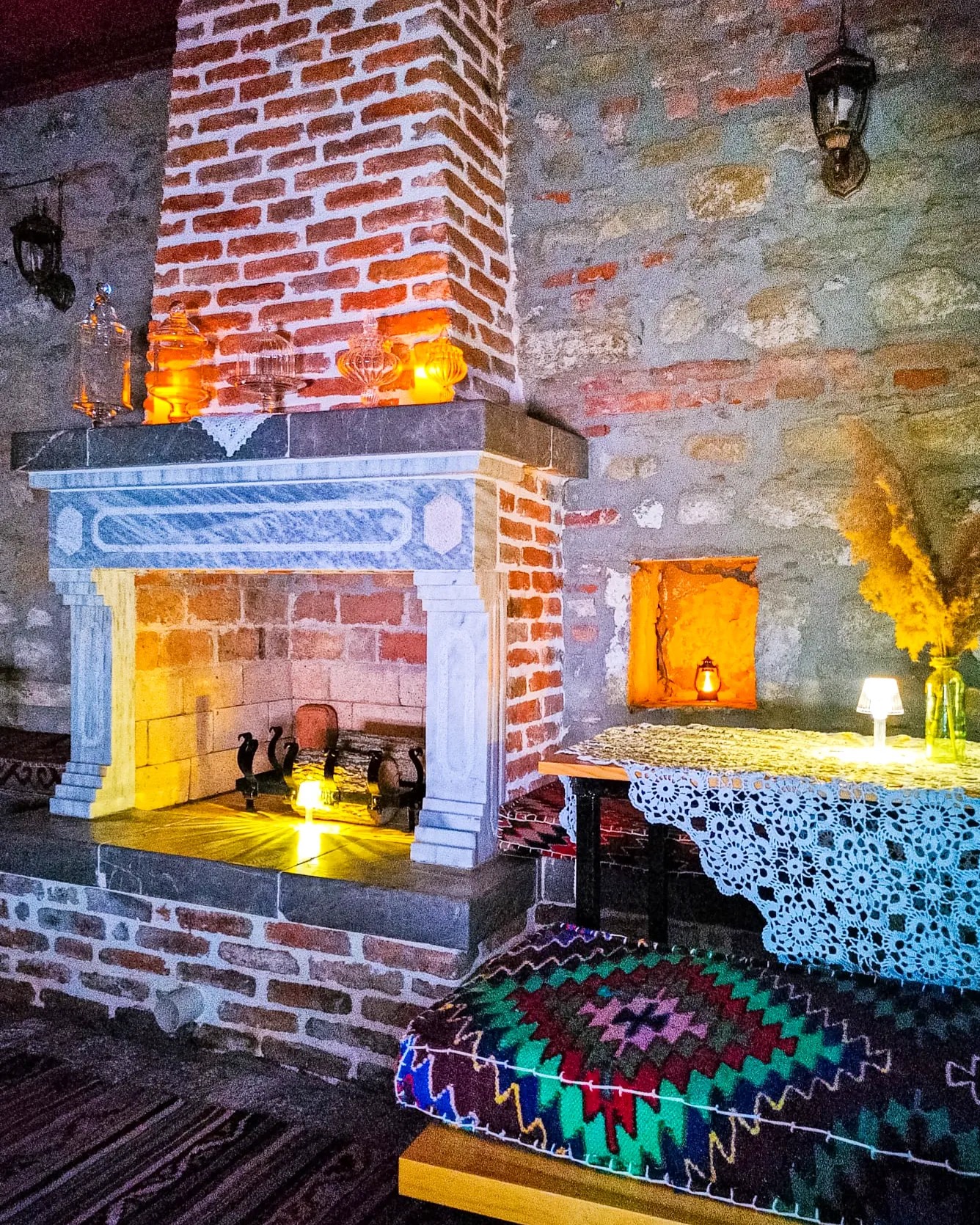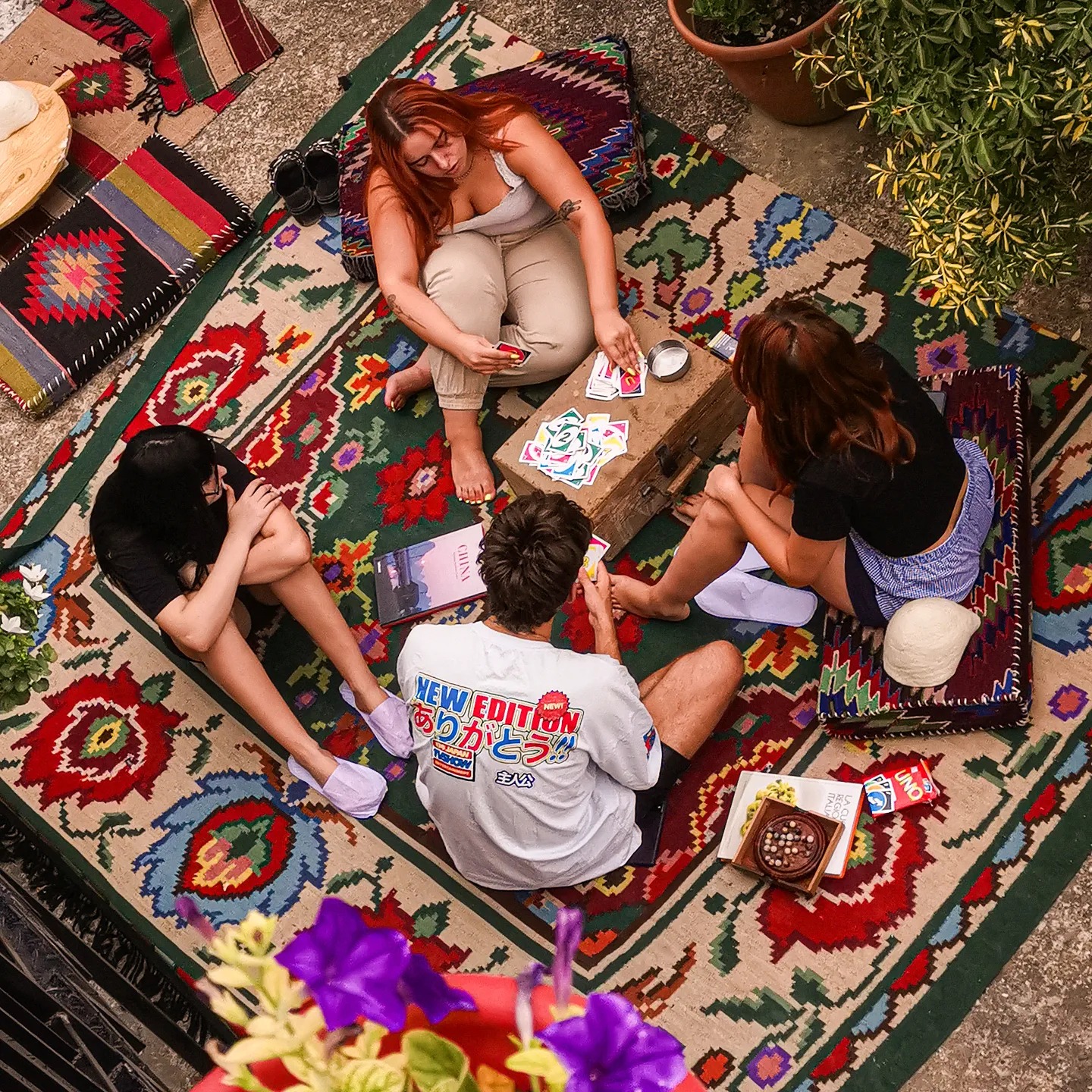Reconnecting with nature
Cultural Accommodation and History
Domus Hotel: A Historic Cultural Accommodation Experience in the heart of the old center of Korça!
Discover Domus, where history meets culture in the heart of historic Korça. The villa from 1921, built by Josif Qirici, close friend of F. Noli and a visionary of Albania's cultural legacy, offers guests an immersive experience that blends traditional charm with modern comfort. Step into a world of rich heritage, local art, and exceptional service, all set in the vibrant streets of Korça, a city known for its history and cultural significance. Experience Korça like never before with Domus!
Albania
Local
The project is implemented in the old city center of Korca, Albania.
It addresses urban-rural linkages
It refers to other types of transformations (soft investment)
Yes
2024-05-15
No
No
Yes
No
Yes
As an individual
Domus Hotel aims to provide a unique cultural accommodation experience that highlights the rich history and heritage of Korça, blending modern comfort with traditional architecture and local art. The hotel seeks to be a prominent landmark in the city, offering guests an immersive cultural journey while promoting sustainable tourism and local craftsmanship.
Cultural and heritage tourists looking to explore the history of Korça.
Art lovers and history enthusiasts seeking authentic experiences.
Sustainable travelers who value eco-friendly and locally-inspired accommodations.
Local residents and community members interested in promoting and experiencing Korça’s cultural pride.
Specific Objectives:
To provide an enriching cultural stay that reflects Korça’s history through design, art, and services.
To promote sustainability by using locally sourced materials and supporting regional artists and artisans.
To create a space where local culture, history, and modern hospitality coexist harmoniously.
To establish Domus Hotel as a key cultural landmark and a center for social and cultural events in Korça.
Achieved Outcomes:
Sustainability: Domus Hotel embraces sustainable practices, such as energy-efficient systems, eco-friendly materials, and waste reduction efforts, which align with the European Bauhaus focus on environmentally conscious design.
Aesthetic quality: The hotel blends historical architectural styles, ensuring both beauty and functionality are key components of its offering.
Inclusion: The hotel serves as a space for cultural exchange, hosting local art exhibitions and community events, thus fostering inclusion and celebrating the diversity of Korça’s heritage.
Innovation: The combination of tradition and modern hospitality features innovative solutions in both design and service, creating an experience that is rooted in the past but forward-looking in its approach.
Domus blends history, culture, and sustainability to preserve Korça's identity!
Cultural and heritage tourists looking to explore the history of Korça.
Art lovers and history enthusiasts seeking authentic experiences.
Sustainable travelers who value eco-friendly and locally-inspired accommodations.
Local residents and community members interested in promoting and experiencing Korça’s cultural pride.
Specific Objectives:
To provide an enriching cultural stay that reflects Korça’s history through design, art, and services.
To promote sustainability by using locally sourced materials and supporting regional artists and artisans.
To create a space where local culture, history, and modern hospitality coexist harmoniously.
To establish Domus Hotel as a key cultural landmark and a center for social and cultural events in Korça.
Achieved Outcomes:
Sustainability: Domus Hotel embraces sustainable practices, such as energy-efficient systems, eco-friendly materials, and waste reduction efforts, which align with the European Bauhaus focus on environmentally conscious design.
Aesthetic quality: The hotel blends historical architectural styles, ensuring both beauty and functionality are key components of its offering.
Inclusion: The hotel serves as a space for cultural exchange, hosting local art exhibitions and community events, thus fostering inclusion and celebrating the diversity of Korça’s heritage.
Innovation: The combination of tradition and modern hospitality features innovative solutions in both design and service, creating an experience that is rooted in the past but forward-looking in its approach.
Domus blends history, culture, and sustainability to preserve Korça's identity!
History
Identity
Sustainability
Inclusion
Preservation
The key objectives of the Domus Hotel project in terms of sustainability are focused on reducing environmental impact while promoting local culture and heritage. These objectives have been met through the following approaches:
Energy Efficiency: The hotel has been designed with energy-efficient systems, including solar panels, LED lighting, and advanced insulation techniques. This reduces energy consumption and carbon footprint while providing a comfortable experience for guests.
Use of Local Materials: Domus Hotel prioritizes the use of locally sourced materials in its construction and interior design, supporting local artisans and minimizing the carbon footprint associated with transportation. This approach promotes regional craftsmanship and strengthens the local economy.
Waste Reduction and Recycling: The hotel implements strict waste management practices, including recycling programs and waste reduction strategies. This minimizes the environmental impact of daily operations and ensures sustainable practices throughout the hotel’s lifecycle.
Water Conservation: The hotel has installed water-saving systems such as low-flow faucets, showerheads, and efficient plumbing systems to reduce water consumption, ensuring a minimal impact on local water resources.
Sustainable Mobility: To further promote sustainability, the hotel encourages guests to use sustainable transport options, such as bicycles or electric vehicles, by offering bicycle rentals a walking guided tour.
Domus stands as a beacon of eco-conscious tourism, offering guests an experience that champions both environmental responsibility and cultural preservation. By adopting sustainable practices throughout its operations ranging from energy conservation to waste reduction the hotel provides an environmentally friendly space for visitors. It immerses guests in the rich cultural fabric of Korça, offering them a unique opportunity to explore local art, history, and traditions.
Energy Efficiency: The hotel has been designed with energy-efficient systems, including solar panels, LED lighting, and advanced insulation techniques. This reduces energy consumption and carbon footprint while providing a comfortable experience for guests.
Use of Local Materials: Domus Hotel prioritizes the use of locally sourced materials in its construction and interior design, supporting local artisans and minimizing the carbon footprint associated with transportation. This approach promotes regional craftsmanship and strengthens the local economy.
Waste Reduction and Recycling: The hotel implements strict waste management practices, including recycling programs and waste reduction strategies. This minimizes the environmental impact of daily operations and ensures sustainable practices throughout the hotel’s lifecycle.
Water Conservation: The hotel has installed water-saving systems such as low-flow faucets, showerheads, and efficient plumbing systems to reduce water consumption, ensuring a minimal impact on local water resources.
Sustainable Mobility: To further promote sustainability, the hotel encourages guests to use sustainable transport options, such as bicycles or electric vehicles, by offering bicycle rentals a walking guided tour.
Domus stands as a beacon of eco-conscious tourism, offering guests an experience that champions both environmental responsibility and cultural preservation. By adopting sustainable practices throughout its operations ranging from energy conservation to waste reduction the hotel provides an environmentally friendly space for visitors. It immerses guests in the rich cultural fabric of Korça, offering them a unique opportunity to explore local art, history, and traditions.
Aesthetics and Quality of Experience at Domus Hotel project is designed to provide an exceptional guest experience by harmonizing aesthetics, comfort, and cultural authenticity. The key objectives in terms of aesthetics and quality of experience focus on creating a visually appealing, immersive, and culturally enriching environment that reflects the heritage of Korça while ensuring modern comfort. Domus integrates traditional architectural elements with contemporary design, creating a space that is both elegant and deeply rooted in the local identity. The façade and interiors showcase locally inspired aesthetics, featuring stonework, wood craftsmanship, and artisanal details that evoke a sense of place. This seamless blend of heritage and modernity ensures that guests experience the cultural essence of Korça. The interior design embraces a warm and inviting atmosphere, achieved through the use of handcrafted furniture, locally woven textiles, and traditional motifs. By collaborating with regional artists and artisans, the hotel functions as a living gallery, displaying art and décor that tell the story of Korça’s history and craftsmanship. This fosters a deep connection between visitors and the local culture. Beyond aesthetics, Domus Hotel prioritizes the use of natural materials create a serene and relaxing environment. Spacious rooms and a carefully curated color palette enhance comfort, while the use of natural light and green spaces promotes a sense of well-being. Domus exemplifies sustainable hospitality by blending architectural beauty with cultural authenticity. Through local craftsmanship, immersive experiences, and eco-conscious design, it preserves heritage while ensuring comfort. This model fosters deep cultural connections, setting a benchmark for responsible, experiential tourism.
The Domus Hotel project is committed to fostering inclusivity across multiple dimensions, ensuring that accessibility, affordability, and inclusive governance are core principles. These objectives have been met through thoughtful design choices, community-focused strategies, and systems that cater to a wide range of needs. The hotel strives to make high-quality hospitality accessible to a broad range of guests, offering tiered pricing structures and packages that cater to diverse budgets. Special offers are created to support local visitors and families, ensuring that both international and local guests can enjoy the services Domus Hotel provides without financial barriers. Domus embraces inclusive governance by engaging local communities and stakeholders in decision-making processes. Local artisans, artists, and cultural representatives are actively involved in shaping the hotel’s offerings, from design elements to cultural programs. The hotel also creates job opportunities that support diverse groups, including women and youth, enhancing the social inclusion of the region with a particular attention to the Rom Community. The hotel’s architecture and interiors prioritize comfort and accessibility without compromising aesthetic appeal. By focusing on usability for everyone, regardless of age, gender, or physical ability, Domus provides an environment that feels welcoming and thoughtful to all guests. Domus Hotel stands as a model for inclusive hospitality, demonstrating that a high standard of design, accessibility, and affordability can coexist with cultural sensitivity. The project not only meets the needs of diverse guests but also integrates local communities into its operations, setting an example for socially responsible tourism that values equity and inclusivity.
The Domus Hotel project has actively engaged local citizens and civil society throughout its development and operations, ensuring that the benefits of the project extend to the broader community. This involvement has been instrumental in shaping the hotel’s design, services, and cultural programs, fostering a sense of ownership and pride among locals while contributing to the social and economic development of the region.
Local Artisans and Craftsmen have played a significant role in the hotel’s renovation and interior design. The use of traditional craftsmanship—such as locally sourced woodwork, textiles, and ceramics—was made possible by close collaboration with regional artisans. This partnership not only preserves the region’s cultural heritage but also provides income and visibility for these local artists. Cultural Experts and Historians have been integral in curating the hotel’s cultural experiences. They’ve contributed to the development of cultural programs, guided tours, and art exhibitions that showcase the history, traditions, and artistic practices of Korça. By integrating the local community's cultural knowledge, the hotel provides authentic and meaningful experiences for its guests while highlighting regional identity.
Domus Hotel will create numerous employment opportunities for local residents, including in hospitality, management, culinary and maintenance service. The hotel has prioritized hiring locally, helping reduce unemployment and contributing to the economic well-being of the area. The collaboration between Domus Hotel and local citizens could ensure that the project is both community oriented and sustainable. This inclusive approach can not only enrich the hotel’s cultural offerings but also fostered a sense of shared ownership among the residents of Korca.
Local Artisans and Craftsmen have played a significant role in the hotel’s renovation and interior design. The use of traditional craftsmanship—such as locally sourced woodwork, textiles, and ceramics—was made possible by close collaboration with regional artisans. This partnership not only preserves the region’s cultural heritage but also provides income and visibility for these local artists. Cultural Experts and Historians have been integral in curating the hotel’s cultural experiences. They’ve contributed to the development of cultural programs, guided tours, and art exhibitions that showcase the history, traditions, and artistic practices of Korça. By integrating the local community's cultural knowledge, the hotel provides authentic and meaningful experiences for its guests while highlighting regional identity.
Domus Hotel will create numerous employment opportunities for local residents, including in hospitality, management, culinary and maintenance service. The hotel has prioritized hiring locally, helping reduce unemployment and contributing to the economic well-being of the area. The collaboration between Domus Hotel and local citizens could ensure that the project is both community oriented and sustainable. This inclusive approach can not only enrich the hotel’s cultural offerings but also fostered a sense of shared ownership among the residents of Korca.
The Domus Hotel project involved a multi-level stakeholder engagement approach, integrating local, regional and national,actors to ensure its success. Their participation contributed to cultural authenticity, economic sustainability, and alignment with broader sustainability and tourism goals.
Local artisans, craftsmen, and businesses were engaged in the construction, interior design, and cultural programming.
Residents contributed through consultations, helping shape community-driven initiatives such as local events and cultural programs.
Strengthened community ownership, economic benefits for local suppliers, and ensured the project reflected Korça’s heritage.
Regional Level (Tourism Boards & Development Agencies)
Regional tourism boards helped integrate Domus Hotel into wider tourism strategies, promoting sustainable travel in Korça.
Development agencies provided funding and advisory support to enhance economic viability and local job creation.
Facilitated compliance with national tourism and sustainability policies, enhancing cultural authenticity and long-term viability.
Local artisans, craftsmen, and businesses were engaged in the construction, interior design, and cultural programming.
Residents contributed through consultations, helping shape community-driven initiatives such as local events and cultural programs.
Strengthened community ownership, economic benefits for local suppliers, and ensured the project reflected Korça’s heritage.
Regional Level (Tourism Boards & Development Agencies)
Regional tourism boards helped integrate Domus Hotel into wider tourism strategies, promoting sustainable travel in Korça.
Development agencies provided funding and advisory support to enhance economic viability and local job creation.
Facilitated compliance with national tourism and sustainability policies, enhancing cultural authenticity and long-term viability.
The design and implementation of the Domus Hotel project integrated expertise from multiple disciplines to create a sustainable, culturally rich, and guest-centric hospitality experience.
Architects and interior designers developed a concept that merges traditional and contemporary aesthetics, ensuring harmony with Korça’s architectural identity.
Experts in sustainable design incorporated energy-efficient materials and accessibility principles.
Historians and cultural experts advised on integrating local heritage into the hotel’s design, storytelling, and guest experience.
Local artists and artisans contributed through handcrafted elements and decorative pieces reflecting regional identity.
Sustainability consultants guided energy efficiency strategies, water conservation systems, and waste management practices.
Environmental scientists ensured that the hotel’s construction and operations had minimal impact on the local ecosystem since the whole building was restored using the same materials from 1900 (years between the building was made).
Hospitality experts optimized service design, ensuring comfort, inclusivity, and high-quality customer experiences.
Economic analysts assessed financial viability, local job creation, and the project’s impact on Korça’s economy.
Business strategists helped position the hotel within national and European tourism markets.
Civil and structural engineers ensured the building’s resilience, energy efficiency, and adherence to modern construction standards.
Technology specialists integrated smart hotel systems for energy management and guest convenience.
Local artisans and residents provided insights that informed architectural and cultural decisions, reinforcing authenticity.
The Domus Hotel project exemplifies how collaboration across disciplines leads to a culturally enriched, sustainable, and inclusive hospitality space. This interdisciplinary synergy sets a benchmark for future sustainable tourism projects.
Architects and interior designers developed a concept that merges traditional and contemporary aesthetics, ensuring harmony with Korça’s architectural identity.
Experts in sustainable design incorporated energy-efficient materials and accessibility principles.
Historians and cultural experts advised on integrating local heritage into the hotel’s design, storytelling, and guest experience.
Local artists and artisans contributed through handcrafted elements and decorative pieces reflecting regional identity.
Sustainability consultants guided energy efficiency strategies, water conservation systems, and waste management practices.
Environmental scientists ensured that the hotel’s construction and operations had minimal impact on the local ecosystem since the whole building was restored using the same materials from 1900 (years between the building was made).
Hospitality experts optimized service design, ensuring comfort, inclusivity, and high-quality customer experiences.
Economic analysts assessed financial viability, local job creation, and the project’s impact on Korça’s economy.
Business strategists helped position the hotel within national and European tourism markets.
Civil and structural engineers ensured the building’s resilience, energy efficiency, and adherence to modern construction standards.
Technology specialists integrated smart hotel systems for energy management and guest convenience.
Local artisans and residents provided insights that informed architectural and cultural decisions, reinforcing authenticity.
The Domus Hotel project exemplifies how collaboration across disciplines leads to a culturally enriched, sustainable, and inclusive hospitality space. This interdisciplinary synergy sets a benchmark for future sustainable tourism projects.
Domus Hotel redefines hospitality by integrating sustainability, cultural authenticity, and community-driven governance in ways that go beyond conventional hotel projects. Unlike mainstream hotels, which often prioritize profit-driven, standardized experiences, Domus Hotel pioneers a holistic, inclusive, and eco-conscious model that sets new benchmarks for sustainable tourism.
Many hotels adopt basic environmental measures as secondary features. Sustainability is embedded in the project's DNA, from construction materials to daily operations. The project utilizes locally sourced, eco-friendly materials to reduce carbon footprint. Solar energy, advanced insulation, and water-saving systems for maximum energy efficiency. A zero-waste approach, including on-site recycling programs and sustainable mobility options like bicycle rentals.
Most hotels offer a universal luxury experience with little connection to local culture.
Domus Hotel aims to be a cultural hub, allowing guests to engage with local art, music, and traditions. Innovations include collaborations with local artisans for handcrafted interior décor. Live performances, traditional storytelling, and cultural workshops to offer an authentic regional experience.
A design that reflects Korça’s architectural heritage, blending contemporary comfort with traditional aesthetics. Domus Hotel integrates local stakeholders at every level: local residents, artists, and businesses help shape hotel programs and services.
The hotel creates jobs for locals, prioritizing regional economic development. It sources food and products from local suppliers, reinforcing sustainability and community support. Domus Hotel transforms hospitality by merging sustainability, cultural identity, preserving Korca's heritage and community participation It challenges conventional models by proving that a hotel can be both environmentally responsible and deeply connected to its local heritage.
Many hotels adopt basic environmental measures as secondary features. Sustainability is embedded in the project's DNA, from construction materials to daily operations. The project utilizes locally sourced, eco-friendly materials to reduce carbon footprint. Solar energy, advanced insulation, and water-saving systems for maximum energy efficiency. A zero-waste approach, including on-site recycling programs and sustainable mobility options like bicycle rentals.
Most hotels offer a universal luxury experience with little connection to local culture.
Domus Hotel aims to be a cultural hub, allowing guests to engage with local art, music, and traditions. Innovations include collaborations with local artisans for handcrafted interior décor. Live performances, traditional storytelling, and cultural workshops to offer an authentic regional experience.
A design that reflects Korça’s architectural heritage, blending contemporary comfort with traditional aesthetics. Domus Hotel integrates local stakeholders at every level: local residents, artists, and businesses help shape hotel programs and services.
The hotel creates jobs for locals, prioritizing regional economic development. It sources food and products from local suppliers, reinforcing sustainability and community support. Domus Hotel transforms hospitality by merging sustainability, cultural identity, preserving Korca's heritage and community participation It challenges conventional models by proving that a hotel can be both environmentally responsible and deeply connected to its local heritage.
The Domus Hotel project followed a multidisciplinary, community-driven, and sustainability-focused approach to ensure a holistic, inclusive, and culturally enriched hospitality model. The methodology combined participatory planning, sustainable design principles, and multi-stakeholder collaboration, setting a benchmark for responsible tourism development. The project engaged local residents, artisans, historians, and municipal authorities from the initial planning stages to ensure alignment with the region’s cultural and economic needs.
As a method for this project we used public consultations and workshops which allowed community members to provide input on design, services, and sustainability priorities. Local craftsmen and artists were directly involved in construction and interior design, preserving Korça’s architectural identity. Partnerships with local businesses ensured the integration of regional products and services into daily operations. The project was guided by green building principles and circular economy strategies to minimize environmental impact. Sustainable construction materials were sourced locally to reduce the carbon footprint. The hotel adopted solar energy, water-saving technologies, and energy-efficient systems for long-term sustainability.
A zero-waste management system was implemented, focusing on recycling, composting, and reducing single-use plastics.
The hotel was designed as a cultural experience, not just accommodation, promoting meaningful guest interactions with local traditions. The Domus Hotel project’s methodology blended community-driven development, environmental sustainability, cultural preservation, and inclusive hospitality. This comprehensive approach ensured long-term success, fostered strong local engagement, and positioned the hotel as an exemplary model of responsible tourism.
As a method for this project we used public consultations and workshops which allowed community members to provide input on design, services, and sustainability priorities. Local craftsmen and artists were directly involved in construction and interior design, preserving Korça’s architectural identity. Partnerships with local businesses ensured the integration of regional products and services into daily operations. The project was guided by green building principles and circular economy strategies to minimize environmental impact. Sustainable construction materials were sourced locally to reduce the carbon footprint. The hotel adopted solar energy, water-saving technologies, and energy-efficient systems for long-term sustainability.
A zero-waste management system was implemented, focusing on recycling, composting, and reducing single-use plastics.
The hotel was designed as a cultural experience, not just accommodation, promoting meaningful guest interactions with local traditions. The Domus Hotel project’s methodology blended community-driven development, environmental sustainability, cultural preservation, and inclusive hospitality. This comprehensive approach ensured long-term success, fostered strong local engagement, and positioned the hotel as an exemplary model of responsible tourism.
The Domus Hotel project serves as a scalable and adaptable model for sustainable and culturally integrated hospitality. Various elements of its methodology, technology, processes, and community engagement approach can be replicated or transferred to different locations, groups of beneficiaries, and contexts, fostering responsible tourism worldwide. Use of locally sourced and sustainable materials to reduce environmental impact. Integration of solar energy, rainwater harvesting, and energy-efficient systems to promote resource conservation. Implementation of zero-waste strategies, including recycling, composting, and eco-friendly product sourcing. Can be applied in new and existing hotels, urban development projects, and sustainable housing initiatives worldwide. Adaptable for rural and urban settings, ensuring environmental benefits in diverse landscapes.
Direct engagement with local residents, businesses, and artisans in project planning and execution. Establishment of inclusive governance models where the community has a stake in the project’s success. Partnerships with local farmers, artists, and entrepreneurs to integrate regional culture into hospitality experiences. Can be replicated in other cultural tourism destinations, eco-lodges, and community-based hospitality ventures. Offers an alternative model for corporate-led tourism, promoting grassroots economic development. Development of cultural experiences, such as traditional music performances, storytelling, and craft workshops. Integration of local architecture and design elements into hospitality spaces. Collaboration with regional historians and cultural institutions to curate immersive guest experiences. Suitable for heritage hotels, cultural centers, and sustainable tourism initiatives worldwide. Can be adapted for museums, historical districts, and indigenous community-led tourism projects.
Domus Hotel proves sustainable, cultural, and community-driven tourism can be adapted globally for impact.
Direct engagement with local residents, businesses, and artisans in project planning and execution. Establishment of inclusive governance models where the community has a stake in the project’s success. Partnerships with local farmers, artists, and entrepreneurs to integrate regional culture into hospitality experiences. Can be replicated in other cultural tourism destinations, eco-lodges, and community-based hospitality ventures. Offers an alternative model for corporate-led tourism, promoting grassroots economic development. Development of cultural experiences, such as traditional music performances, storytelling, and craft workshops. Integration of local architecture and design elements into hospitality spaces. Collaboration with regional historians and cultural institutions to curate immersive guest experiences. Suitable for heritage hotels, cultural centers, and sustainable tourism initiatives worldwide. Can be adapted for museums, historical districts, and indigenous community-led tourism projects.
Domus Hotel proves sustainable, cultural, and community-driven tourism can be adapted globally for impact.
The Domus Hotel project tackles several global challenges by implementing local, scalable solutions that promote sustainability, cultural preservation, and social inclusion. Through its innovative approach, the project provides a model for responsible tourism, addressing issues such as climate change, cultural homogenization, economic inequality, and accessibility. Energy-efficient design using solar panels, insulation, and LED lighting to reduce carbon footprint. Water conservation systems (low-flow fixtures, rainwater harvesting) to minimize local water resource depletion.
Zero-waste initiatives, including recycling, composting, and eliminating single-use plastics. Sustainable mobility, promoting bicycle rentals and pedestrian-friendly tourism. Mass tourism often erodes local traditions and replaces them with standardized experiences. Many hotels adopt globalized designs, neglecting regional architectural and artistic heritage.
Integration of local architecture and materials to preserve Korça’s identity. Collaboration with local artisans for interior design, furniture, and decor, supporting traditional craftsmanship. Cultural programming, such as storytelling, art exhibitions, and traditional cooking workshops, to engage visitors in authentic experiences. Domus Hotel offers scalable local solutions to global issues, proving that sustainable, culturally rich, and inclusive tourism can drive positive change. Its model can be replicated worldwide, helping communities build eco-friendly, socially responsible, and economically resilient tourism sectors.
Zero-waste initiatives, including recycling, composting, and eliminating single-use plastics. Sustainable mobility, promoting bicycle rentals and pedestrian-friendly tourism. Mass tourism often erodes local traditions and replaces them with standardized experiences. Many hotels adopt globalized designs, neglecting regional architectural and artistic heritage.
Integration of local architecture and materials to preserve Korça’s identity. Collaboration with local artisans for interior design, furniture, and decor, supporting traditional craftsmanship. Cultural programming, such as storytelling, art exhibitions, and traditional cooking workshops, to engage visitors in authentic experiences. Domus Hotel offers scalable local solutions to global issues, proving that sustainable, culturally rich, and inclusive tourism can drive positive change. Its model can be replicated worldwide, helping communities build eco-friendly, socially responsible, and economically resilient tourism sectors.
The Domus Hotel has actively contributed to the cultural enrichment of Korça by integrating art, poetry, and photography into its hospitality experience. These initiatives have created a dynamic cultural hub, benefiting both direct and indirect beneficiaries while reinforcing the hotel’s role as a model for sustainable and cultural tourism.Regular art exhibitions featuring local and regional artists, providing a platform for emerging talent.
Collaborations with art institutions and galleries, strengthening the local creative economy. Cultural tourism growth, attracting visitors who seek authentic and immersive experiences.
For Direct Beneficiaries (Artists & Art Community):
Increased visibility and commercial opportunities for artists.
Financial support through sales and commissioned work.
Networking opportunities with art collectors, tourists, and cultural organizations.
For Indirect Beneficiaries (Local Businesses & Economy):
Boost in local businesses (cafés, restaurants, and shops) from art-related tourism.
Enhancement of Korça’s reputation as a cultural destination.
Integration of art into daily life, making the city more vibrant and inspiring.
Stronger local economy through increased cultural tourism.
Preservation and promotion of regional artistic and literary heritage.
More job opportunities for artists, poets, photographers, and cultural professionals.
Elevated cultural status of Korça, positioning it as a leading destination for art, literature, and photography.
By integrating art, poetry, and photography, Domus Hotel has redefined hospitality, creating a space where culture thrives, communities connect, and visitors experience the authentic soul of Korça.
Collaborations with art institutions and galleries, strengthening the local creative economy. Cultural tourism growth, attracting visitors who seek authentic and immersive experiences.
For Direct Beneficiaries (Artists & Art Community):
Increased visibility and commercial opportunities for artists.
Financial support through sales and commissioned work.
Networking opportunities with art collectors, tourists, and cultural organizations.
For Indirect Beneficiaries (Local Businesses & Economy):
Boost in local businesses (cafés, restaurants, and shops) from art-related tourism.
Enhancement of Korça’s reputation as a cultural destination.
Integration of art into daily life, making the city more vibrant and inspiring.
Stronger local economy through increased cultural tourism.
Preservation and promotion of regional artistic and literary heritage.
More job opportunities for artists, poets, photographers, and cultural professionals.
Elevated cultural status of Korça, positioning it as a leading destination for art, literature, and photography.
By integrating art, poetry, and photography, Domus Hotel has redefined hospitality, creating a space where culture thrives, communities connect, and visitors experience the authentic soul of Korça.

